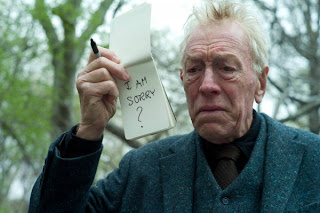A Separation
**** out of ****
Directed by: Asghar Farhadi
Starring: Peyman Moaadi, Leila Hatami, Sareh Bayat, Shahab Hosseini and Sarina Farhadi
Running time: 123 minutes

As Iran’s unsavoury military maneuvers, nuclear suspicions and execution deals fill newspapers, the Middle Eastern nation may be the least desired place for moviegoers to escape to.
However, rejecting the Iranian drama A Separation – the Golden Bear winner at last year’s Berlin Film Festival – would also shun one of the most gripping films to emerge from any country in years.
Also a front-runner for the Foreign Language Film Oscar, it begins with an intense argument between Nader (Peyman Moaadi) and Simin (Leila Hatami) husband and wife of an upper-middle class Tehran family.

Simin wants to separate from Nader so she can take their 11-year-old daughter, Termeh (Sarina Farhadi), abroad to live with the rest of her family before her visa expires. However, Nader argues that he cannot abandon his father, who is dying from Alzheimer’s.
While Simin’s divorce application is rejected, she moves out of the family apartment. At his wife’s behest, Nader hires a house cleaner named Razieh (Sareh Bayat) to look after his father and keep the apartment in order.
But Razieh isn’t the ideal candidate for the job: the long commute to the apartment fatigues her and the sick father’s needs go against her religious accordance.

To dissolve further into the growing tension between Razieh and Nader, which stems from lies, deceptions and other misunderstandings between the two, would be unfair. That could ally this reviewer to side with one party. The strength of this drama comes from having to constantly rejudge the situation as new details are introduced and character motivations are revealed.
Nearly every scene from the midpoint on emerges with the velocity and intensity of a wired negotiation between bitter rivals. The pointed words, fiery and direct, create friction and Farhadi’s piercingly honest screenplay allows words to fling and dialogue to overlap without ever settling for one dominating stream.
It’s a richly nuanced piece of writing that deserves study in screenwriting classes, and is only heightened further by Farhadi’s objective eye as a director. Farhadi lets doubt and ambiguity simmer, letting the camera tighten on the faces and catch each character’s unblemished outrage.

Each scene comes equipped with the fragile, flawed characters coming to grips with their own humiliations and irresponsibility. The motivations of the characters are always clear, their impervious sentiments toward the escalating events fascinating to watch and brought to life with nuanced performances.
Meanwhile, the short scenes linking the negotiations are set in cars as the characters, rushing and embittered, navigate the twisty streets of Tehran. The lanes are close, the drivers are impatient and one just waits for a collision. These exterior scenes have the same intensity as the indoor confrontations.

The cast is uniformly compelling, although Peyman Moaadi deserves major notice for his commanding portrayal of a deeply frustrated father trying to teach his daughter how to negotiate when he is failing to do the same.
A Separation is a gut-wrenching pressure-cooker and an astounding human drama that shows simple characters trying to deal with a complicated situation.


























